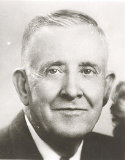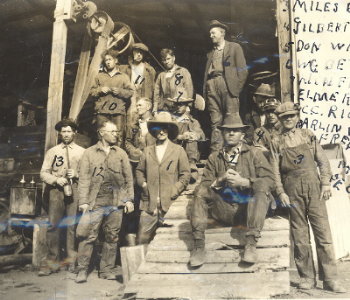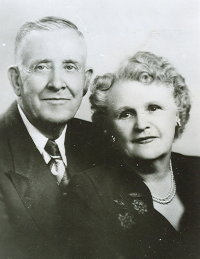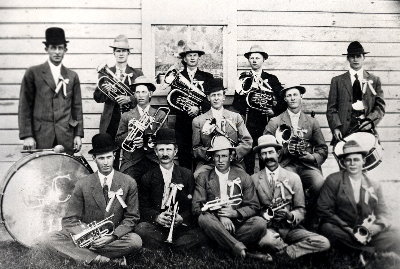 I, William Cotton Betteridge, son of William Cotton Betteridge and Sarah Patience Paskett, was born on April 6, 1881, in Grouse Creek, Box Elder County, Utah. I have three brothers and two sisters, James, John, Mary Elizabeth, Penelope and Edgar. Mary died in her first year at Henefer, Utah before the family moved to Grouse Creek. I spent my early days helping my father on the farm.
I, William Cotton Betteridge, son of William Cotton Betteridge and Sarah Patience Paskett, was born on April 6, 1881, in Grouse Creek, Box Elder County, Utah. I have three brothers and two sisters, James, John, Mary Elizabeth, Penelope and Edgar. Mary died in her first year at Henefer, Utah before the family moved to Grouse Creek. I spent my early days helping my father on the farm.
In my time at Grouse Creek, there was a little log schoolhouse about a half of a mile from my home. I was a little late in starting school. I don’t know why. I went to that school through the eighth grade with flying colors. My sister, Penelope, and I graduated at the same time. My first teacher’s name was Hattie Nichols from Brigham City,Utah. My graduation teacher’s name was Moroni Beck of Newton, Utah. After finishing grade school, I worked on my father’s farm again. I milked cows, fed the pigs, hauled manure, helped irrigate in the summer time and put up hay and fed it to the cows in the winter.
The first time I went out to work was at the age of ten, docking lambs. My wage was twenty-five cents a day. I got older and tougher as time went on, I remember, and they kept me very busy at home. I wore homemade shoes, homemade pants and socks that my mother knitted and I was as happy as a king. When I got older, I had my own horse and saddle, and still thinking I had the top place in the world, I enjoyed every day. When I was about sixteen years old, I started to shear sheep and worked at that every spring until I was about fifty years old.
At the age of eighteen, I went to Oakley, Idaho to attend the Latter-day Saints Academy. I went about two days and became so homesick that I went back home to the farm. The next school year, I tried again and stuck it out that time. The next summer I went to Tacoma, Nevada and worked in a store to relieve my brother, Jim, for about a month, then went back to the farm again. About that time, my father and us boys increased the size of the farm by buying the John Haynes and Teddy Kimber farms. It increased the work too. So that kept me from playing tricks on my neighbors.
Brother Jim was called on a mission to England and I was hired to take his place in Tacoma, Nevada again. I stayed there about three years. Then I went back to the farm again.

Work Crew 1-Joe Bardsley, 2-W.I. Richins, 3-Miles Bardsley, 4-Gilbert Monsen, 5-Don Wakefield, 6-W.C Betteridge, 7-Winfred Kimber, 8-Elmer Kimber, 9-C.C. Richins, 10-Arlin Wakefield, 11-Fred Jorgensen, 12-M.E. Wakefield, 13-E.O. Kimber
About the year 1900, there was a family emigrated from England and came to live in my hometown. In the family, whose name was Hadfield, was a very beautiful girl, the most beautiful girl I had ever seen. Her name was Mary Elizabeth and she was about the age I thought I would like for a life’s companion. So what did I do but play up to her, and after a hard struggle, she promised to take me on for better or worse. We were married on October 3, 1902 in the Salt Lake LDS Temple. I was working at Tacoma, Nevada at the time, so I took her there to live.
We stayed in Tacoma about ten months, then we returned to Grouse Creek. There, on July 27, Hilda was born. We never went back to Tacoma and we moved into two rooms of the old Teddy Kimber house, which, at that time, was owned by the Betteridge family. John Betteridge, my brother, and his family lived in the other two rooms. We lived there about a year, then moved to San Jacinto, Nevada. I was offered a job as clerk and post master of the Sparks Herrold Store.
There were only two families living at that place but they supplied all the ranches on the Sparks Herrold range. Our nearest neighbors were one family about ten miles north and another family twenty miles to the south. We used to travel by stage coach and four horses, like we see on TV today. While we were in San Jacinto, our second child, Ella, was born.
After about three years at San Jacinto, we went back to the farm in Grouse Creek and, with the money we had saved, we built a four-room frame house on the main street. We became very active in the ward and after a short time, I was made Ward Clerk. In this job you learn everything that is going on, even the ages of all the women, and most of them don’t take too kindly to that. I kept that job for about thirty-two years under the different Bishoprics. I busied myself to quite an extent in dramatics for the ward financings. Think of it, I played comic parts all the time.
My family went into the mercantile business for a while and stayed in it until we were burned out. I worked in the store and my three brothers took care of the farm, cattle, and horses.
I served as a Notary Public, Secretary of the Grouse Creek Farm Loan Association and as a U.S. Commissioner for about twenty years.
New babies kept coming along until we had eight of them, each of them a little bigger. Their names were Hilda, Ella, Doris, Therma, Wilma, Kenneth, Clara and Betty. I was a janitor at the school for four or five years during this time.

William & Mary Betteridge
Our little home at Grouse Creek was filled to overflowing, but we enjoyed it always. My wife, a very good housekeeper and absolutely thorough in everything she did, managed very well our domestic affairs. She was a real thinker, having been trained by a mother who was ambitious and thrifty.
In our home we never had a big family quarrel. Our children respected each other. We did not have very much money and had to economize, but we were always happy. All of our children graduated from high school. And all of them have been through the temple. None of us were ever brought before the law for misconduct.
At one time, we owned a ranch at the foot of Pilot’s Peak. We used to take our cattle down there to winter them. The winters were much milder there and it was an excellent place for the cattle. We would take our families along with us. We did this in turn until our children were old enough to go to school. Then we sold out because there was no school there.
One winter a big windstorm came up during the night and the cattle all drifted toward the Great Salt Lake. When we went out to feed them the next morning, they were all gone. We saddled our horses and rode out to find them. We found them bogged down in the lake with just their heads above the water. They were in so deep we were unable to get them out. We rode in on our horses and cut their throats and left them there. Some months later, we went back and they were still there. With the lake being so salty, they were well preserved.
That same winter, Hilda bumped into her mother, who was carrying a large pan of hot water and it spilled on her head and burned her quite badly. We had to take her to Grouse Creek where we could get help for her. She lost her hair and we thought she would be badly scarred, but her hair grew back and the scars disappeared as she grew older. That was the last winter we spent at the Pilot’s Peak ranch.
I played in the Grouse Creek band for a while too. I played the fiddle for lots of dances. One fellow told me he had danced many miles to my fiddling.

Grouse Creek Band
Back Row: Ted Betteridge, Clarence Richins, Wilford Richins, Newell Richins, Joseph Lee
Middle Row: Art Richins, William C. Betteridge, Stephen Paskett
Front Row: Frank Paskett, James Cook, Alma Toyn, John Ballingham, David Toyn
I was in the sheep business for four or five years. I did not like it very well because it kept me away from home too much, so I sold out and bought cattle. I leased my property to my grandson, Merlin Tanner, and I moved to Ogden, Utah where my family had moved some time before. I went to work for “Uncle Sam.” I liked that better. I stayed with “Uncle Sam” for fifteen years. I was in charge of the packing and shipping department at the depot on Second Street.
My children were all girls but one. That left me quite alone to run the farm. Lots of help for mother, but not much for dad. But as they grew up, they donned overalls and a straw hat and went to work. Ella milked the cows and did the chores when I had to be away from home. But when harvest time came, they all pitched in and helped get the job done. We also helped my brother, Ted, get his crops in.
After moving to Ogden, we went to the temple a lot, and did temple work for the dead. We did work for 2,000 names. We belonged to the Ogden 24th Ward for a number of years and we had a very up and going genealogy leader by the name of Harold Goucher. He would charter a bus and load it with temple workers and, in this way, we had the opportunity to visit Mesa, St. George, Manti,Idaho Falls, Canadian, Logan and Salt Lake temples. On a trip east we visited the Kirtland temple and many other places of interest in Church History.
Our family has always been close. Each year, on the Saturday nearest my wife’s birthday, we all get together at our daughter Wilma’s home in Roy, Utah and have a family reunion. At Christmas time, we have a party for the children under twelve years of age, with a Santa Claus, Christmas stockings and a good time for all.
Our family is getting more scattered as time goes on. Many of the grandchildren have moved to other states on account of their work, but they make it back home about once a year so we are still in touch.
All of our family moved to Ogden, except Ella. She was married and stayed in Grouse Creek. Grouse Creek will always seem like home to us and we go back every chance we get.
This little memo tells only the good side of my life. The bad things I will try and keep to myself.
His wife, eight children, twenty-seven grandchildren and forty-four-great grandchildren survived William Cotton Betteridge, who passed away on October 12, 1966, at his home in Ogden, Utah. He is buried in the Washington Heights Cemetery in Ogden.
